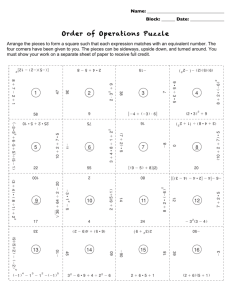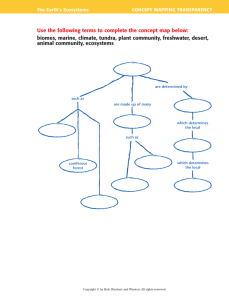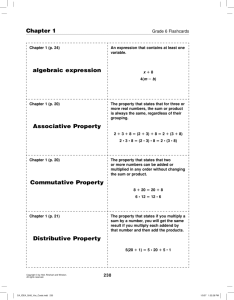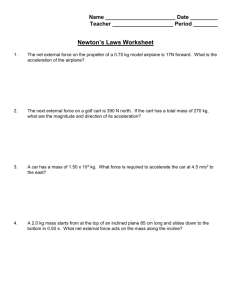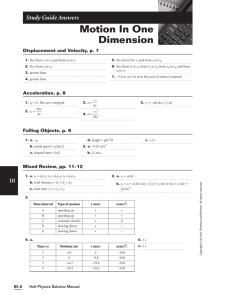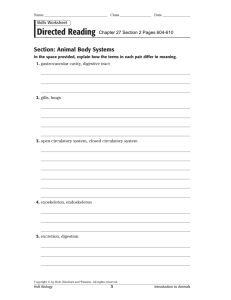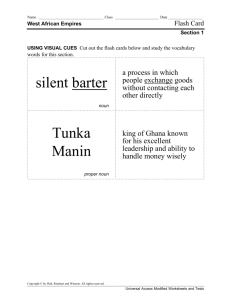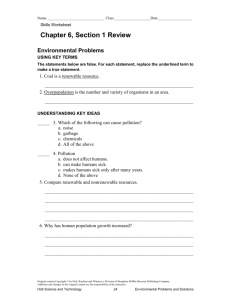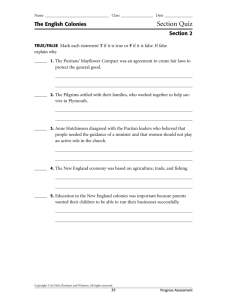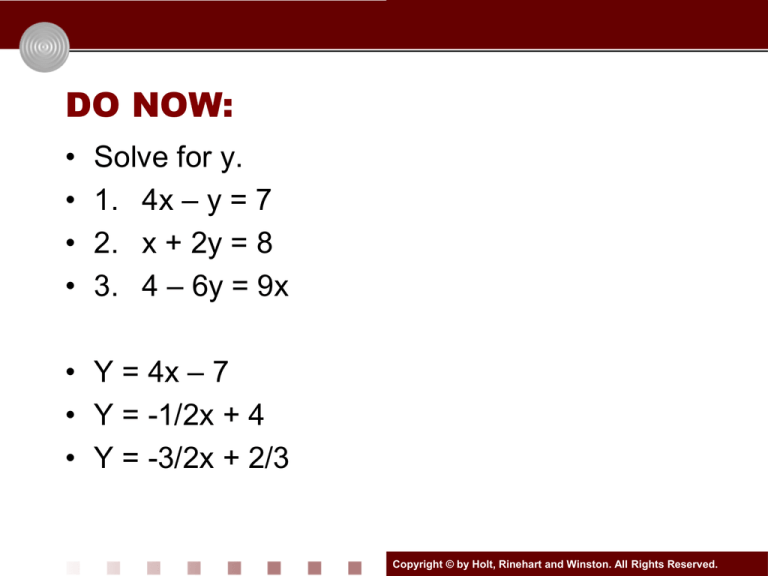
DO NOW:
•
•
•
•
Solve for y.
1. 4x – y = 7
2. x + 2y = 8
3. 4 – 6y = 9x
• Y = 4x – 7
• Y = -1/2x + 4
• Y = -3/2x + 2/3
Copyright © by Holt, Rinehart and Winston. All Rights Reserved.
Graphing Systems of Equations
Coordinate Algebra
Standard: A.REI.6
Copyright © by Holt, Rinehart and Winston. All Rights Reserved.
Graphing Systems of Equations
Essential Question
• How do I solve systems of equations
graphically?
Copyright © by Holt, Rinehart and Winston. All Rights Reserved.
Graphing Systems of Equations
Terms
System of Equations: two equations in two
variables.
Solution to a System: ordered pair that is a
solution to all equations in the system.
The answer to a system is the point of
intersection for the two lines!
Copyright © by Holt, Rinehart and Winston. All Rights Reserved.
Graphing Systems of Equations
Key Skills
Graphing a system. Let’s take a look.
3x – 2y = 2
2x – 3y = 8
3x – 2y = 2
3
y= x–1
2
2x – 3y = 8
2
8
y= x–
3
3
TOC
Copyright © by Holt, Rinehart and Winston. All Rights Reserved.
Ex. 1) Solve the system by graphing.
• Graph paper and a ruler is needed to give the most
accurate answer!
• Make sure both equations are in SLOPE-INTERCEPT
form for easy graphing!
• Graph both lines.
• At what point do the two lines intersect?
y 3x 1
y
x
5
Copyright © by Holt, Rinehart and Winston. All Rights Reserved.
Y= 3x + 1
Y= -x + 5
The point
of
intersection
is (1, 4).
Copyright © by Holt, Rinehart and Winston. All Rights Reserved.
Y = 3x + 1
Y = -x + 5
• Since (1,4) is the intersection, this is the
ordered pair that is a solution to both lines;
therefore, it is THE answer to the system!
• How can you check yourself?
• SUBSTITUE (1,4) in both equations to make
sure its TRUE.
• 4 = 3(1) + 1
true
• 4 = -(1) + 5
true
Copyright © by Holt, Rinehart and Winston. All Rights Reserved.
Ex 2)
• Solve the system of equations by graphing.
• Remember if your equations are NOT in slope
intercept form (y = mx + b), you must make it that
way!
• Graph both lines.
• What is the intersection?
• Check by substitution.
Y = 2x + 2
Y
=
-x
1
Copyright © by Holt, Rinehart and Winston. All Rights Reserved.
Y = 2x + 2
Where do
they
intersect?
Y = -x - 1
Use
substitution
to check!
0=2(-1) + 2
The
solution is
(-1, 0)
true
0= -(-1)-1
true
Copyright © by Holt, Rinehart and Winston. All Rights Reserved.
Ex. 3)
• Change both to slopeintercept form.
• Graph both lines on a
common coordinate
plane to find a common
solution.
3x + y = 4
X - 2y = 6
Y = -3x + 4
Y= ½ x - 3
Copyright © by Holt, Rinehart and Winston. All Rights Reserved.
Y = -3x + 4
The
solution
to the
system
is (2, -2)
Y = 1/2x - 3
3x + y =4
3(2) + (-2) = 4
6–2=4
true
x – 2y = 6
Check
your
answer.
2 – 2(-2) = 6
2+4=6
true
Copyright © by Holt, Rinehart and Winston. All Rights Reserved.
Ex 4) Solve by graphing.
• Solve for y.
• Use slopes and
intercepts to graph on
common plane.
• Where do they
intersect?
Y + 2x = 2
Y + x = 1
Y = -2x + 2
Y = -x + 1
Copyright © by Holt, Rinehart and Winston. All Rights Reserved.
Y = -2x + 2
The
solution to
the system
is (1, 0)
Y = -x + 1
y + 2x = 2
0 + 2(1) = 2
true
y+x=1
Check by
substitution!
0+1=1
true
Copyright © by Holt, Rinehart and Winston. All Rights Reserved.
Summarizer
• When solving systems of equations by graphing,
WHY do we need to make sure each equation of a
line is in slope-intercept form?
• How do you check your answer from the graph?
• Why is it important to do this?
• So you can see the slope and intercept!
• Substitute the ordered pair into the system!
• IN case your graph is a little inaccurate, you can see
the mistake !
Copyright © by Holt, Rinehart and Winston. All Rights Reserved.
Homework
• worksheet
Copyright © by Holt, Rinehart and Winston. All Rights Reserved.

